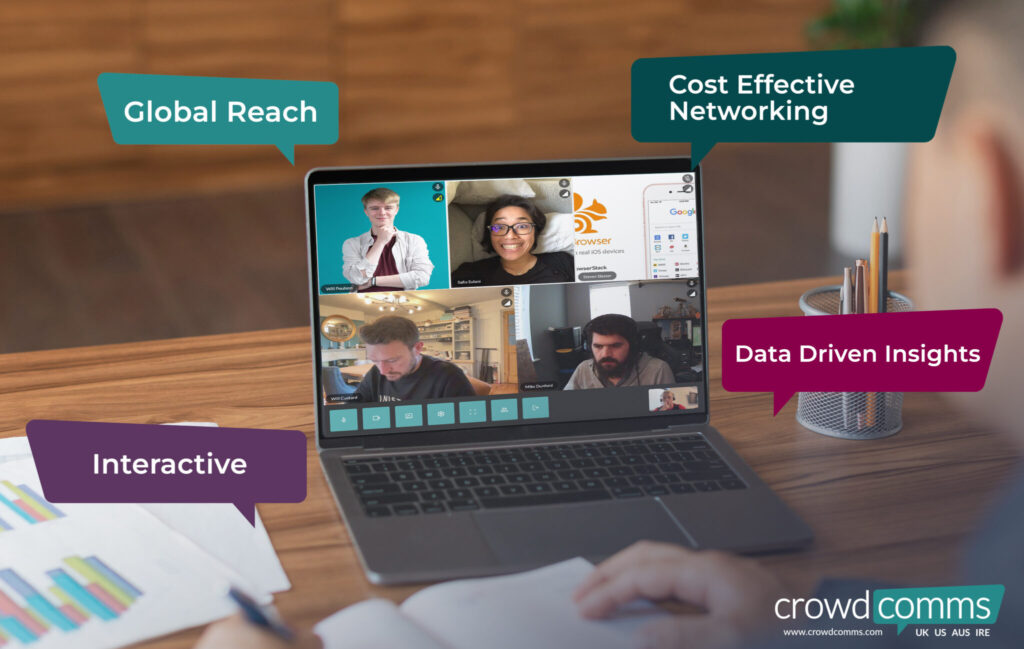
Defined as digitally hosted gatherings that take place over the web (either browser or mobile device based), these events can range from webinars, conferences, and workshops to virtual trade shows and expos.
Historically, virtual events were a niche offering, often overshadowed by the grandeur and networking opportunities of physical events. However, the pandemic served as a catalyst, propelling their evolution from an auxiliary option to a mainstream necessity and sometimes…flopping rather disgracefully.
During the pandemic, travel restrictions and social distancing norms rendered physical gatherings impractical, if not impossible. Organizations swiftly pivoted to virtual platforms to maintain continuity in communication, training, marketing, and community building. This shift was not merely a stopgap solution but a revelation; it highlighted the myriad advantages inherent to virtual events, from cost savings and broader accessibility to environmental sustainability.
As we enter into the new “normal” where virtual events are becoming more common, it is important to understand their relevance and how they can be effectively utilised in various sectors.
In this comprehensive guide, we will delve deeper into the significance of virtual events and provide insights on how to make them successful for your business whether you aim to host an internal sales conference, a global trade show, or an educational workshop.
Virtual Events in Today’s Context
In today’s context, virtual events are more relevant than ever. They are not merely contingency plans but strategic tools complementing physical events, providing year-round interaction and engagement – and are extremely easy to deliver.
Unlike physical events that are bound by geographic and logistical constraints (and budgets!), virtual events democratise access, allowing participants from across the globe to join without the need for travel or significant expenditure. Many speakers can now share their valuable insights without the need for expensive flights or accommodation, making it easier to bring in diverse perspectives and expertise.
Virtual events also offer unique benefits that physical events struggle to match. For instance, they enable detailed analytics and insights into attendee behaviour and interaction through the platform, which can be used to tailor content and improve future events.
Virtual events are incredibly flexible too; they can be recorded and repurposed as on-demand content, extending their reach and lifespan. The ability to integrate with various digital tools and platforms enhances the overall experience, making it possible to create personalised and interactive encounters for each virtual event participant.
The Power of Year-Round Networking
One of the most compelling advantages of virtual events is their capacity to facilitate year-round networking or communities.
Unlike physical events, which are often one-off occurrences over a couple of days, virtual events can be strategically scheduled throughout the year to maintain continuous engagement with your mobile conference audience.
This approach helps build stronger, more enduring relationships among participants but also allows the organisers to stay connected with their audience, gather feedback on event experiences, trends and topics, in real-time. It is also an excellent platform for participants to connect with like-minded individuals from across the globe and build meaningful relationships that can lead to future collaborations or opportunities.
Year-round virtual events can include regular webinars, panel discussions, workshops, and virtual meetups, ensuring that the community stays active and connected. Advanced networking features like virtual breakout rooms, AI-driven matchmaking, and interactive Q&A sessions further enhance the experience, enabling meaningful connections and collaborations. You can have a look at some of the features of the CrowdComms Virtual Event Platform here.
By thoughtfully integrating virtual events into their annual strategy, organizations can maintain a vibrant network and foster ongoing dialogue, significantly enhancing the impact and ROI of their event programs.

Seven Advantages of Virtual Events
Virtual events have numerous advantages that make them increasingly relevant in today’s world. Here are some key benefits of virtual events:
- Cost Savings: The cost savings associated with virtual events cannot be overstated. Hosting an event virtually eliminates the need for expensive venues, catering, travel, and accommodation expenses. This allows organizations to allocate more resources towards other aspects of the event and often results in higher ROI.
- Accessibility: Virtual events break down geographical barriers, allowing attendees from across the globe to participate. This opens up new opportunities for networking and learning, ultimately leading to a more diverse and inclusive event experience.
- Environmental Sustainability: With virtual events, there is no need for travel or printed materials, significantly reducing the carbon footprint of an event. This aligns with the growing demand for environmentally responsible practices in today’s world.
- Flexibility: Virtual events can be recorded and repurposed as on-demand content, making them accessible anytime and anywhere. They also offer flexible scheduling options, allowing participants to attend at their convenience.
- Enhanced Engagement: Virtual events often incorporate interactive elements such as live polls, chat functions, and Q&A sessions, which actively engage attendees in the experience. This increased interaction helps participants feel more connected and invested in the content, fostering a sense of community that mimics in-person gatherings.
- Comprehensive Analytics: The digital nature of virtual events allows for in-depth analytics and data collection, providing organisers with valuable insights into attendee behaviour and preferences. By analysing this data, organisations can better understand their audience, refine future event strategies, and measure the overall success of their initiatives.
- Diverse Content Formats: Virtual events offer the flexibility to present content in various formats, catering to different learning styles and preferences. Whether through webinars, workshops, panel discussions, or virtual exhibitions, organisers can create dynamic and engaging programs that keep participants returning for more, ensuring a richer educational experience.
10 Tips for Virtual Event Networking
Effective networking during virtual events requires a different set of skills and strategies compared to traditional face-to-face interactions. Here are ten tips to help you navigate virtual event networking successfully:
- Prepare in Advance: Research the event agenda, speakers, and fellow participants ahead of time. Identify key individuals you want to connect with and prepare your talking points.
- Create a Professional Profile: Ensure your event platform profile is complete and up-to-date. Include a professional photo, a concise bio, and links to your LinkedIn profile or other relevant social media accounts.
- Engage Actively: Participate in live chats, Q&A sessions, and discussion forums. Asking insightful questions and sharing your expertise can help you stand out and attract attention.
- Leverage Breakout Rooms: Use breakout rooms and smaller group sessions to your advantage. These settings are ideal for more intimate and focused discussions.
- Utilize Networking Tools: Take full advantage of the event’s networking features, such as AI matchmaking, attendee directories, and virtual business card exchanges.
- Follow Up Promptly: After making a connection, follow up quickly with a personalized message or email. Reference your conversation and express interest in continuing the dialogue.
- Schedule One-on-One Meetings: Many virtual event platforms allow you to schedule private meetings with other attendees. Use this feature to have in-depth conversations.
- Be Mindful of Virtual Etiquette: Maintain professionalism during virtual interactions. Dress appropriately, mute your microphone when not speaking, and be respectful of others’ time and contributions.
- Share Valuable Content: Offer to share relevant articles, resources, or insights with your new contacts. Providing value can help establish you as a knowledgeable and generous networker.
- Stay Connected: Maintain the relationships you build during the event. Connect on LinkedIn, join relevant groups, and continue engaging with your new contacts through social media and other channels.
Conclusion
The effective integration of virtual event platforms alongside traditional physical events creates a powerful synergetic approach that significantly enhances the overall event experience.
By embracing virtual tools year-round, organisations can sustain ongoing conversations beyond the confines of a single event, fostering deeper connections and continuous engagement among participants.
This approach not only facilitates broader accessibility, allowing diverse audiences to join discussions and share insights, but it also enables organisers to gather comprehensive data and analytics to inform future strategies.
The flexibility offered by virtual platforms means that content can be consumed at participants’ convenience, thereby increasing attendance and participation metrics. Ultimately, by blending virtual and physical events, organisations can create a more inclusive environment that maximises the impact of their initiatives, nurtures community, and drives measurable results for their event programs.
Aren’t sure where to start with planning your virtual or hybrid event? Give our team at CrowdComms a call and let us help you navigate the world of virtual events!. We have extensive experience in delivering successful virtual and hybrid event solutions, and we’d love to help make your next event a memorable one, for the right reasons.
Contact us: CrowdComms




